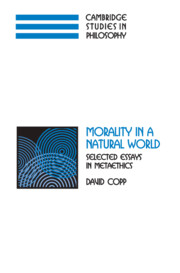Book contents
- Frontmatter
- Contents
- Preface
- Acknowledgments
- Introduction
- Part One Naturalism: Epistemology and Metaphysics
- Part Two Referring to Moral Properties
- Part Three Naturalism and Normativity
- 8 Moral Naturalism and Three Grades of Normativity
- 9 The Ring of Gyges: Overridingness and the Unity of Reason
- 10 The Normativity of Self-Grounded Reason
- Index
- References
9 - The Ring of Gyges: Overridingness and the Unity of Reason
Published online by Cambridge University Press: 19 July 2009
- Frontmatter
- Contents
- Preface
- Acknowledgments
- Introduction
- Part One Naturalism: Epistemology and Metaphysics
- Part Two Referring to Moral Properties
- Part Three Naturalism and Normativity
- 8 Moral Naturalism and Three Grades of Normativity
- 9 The Ring of Gyges: Overridingness and the Unity of Reason
- 10 The Normativity of Self-Grounded Reason
- Index
- References
Summary
INTRODUCTION
Does morality override self-interest? Or does self-interest override morality? These questions become important in situations where there is conflict between the overall verdicts of morality and self-interest, situations where morality on balance requires an action that is contrary to our self-interest, or where considerations of self-interest on balance call for an action that is forbidden by morality. In situations of this kind, we want to know what we ought simpliciter to do. If one of these standpoints overrides the other, then there is a straightforward answer. We ought simpliciter to act on the verdict of the overriding standpoint.
For purposes of this chapter, I assume that there are possible cases in which the overall verdicts of morality and self-interest conflict. I will call cases of this kind “conflict cases.” The verdict of morality in a conflict case would be a proposition as to what we ought morally to do, or as to what we have the most moral reason to do; the verdict of self-interest would be a proposition as to what we ought to do in our self-interest, or as to what action is best supported by reasons or considerations of self-interest. These propositions are action-guiding or normative in a familiar sense. The conflict between morality and self-interest in conflict cases is therefore a normative conflict; it is a conflict between the overall verdicts of different normative standpoints.
- Type
- Chapter
- Information
- Morality in a Natural WorldSelected Essays in Metaethics, pp. 284 - 308Publisher: Cambridge University PressPrint publication year: 2007
References
- 6
- Cited by



